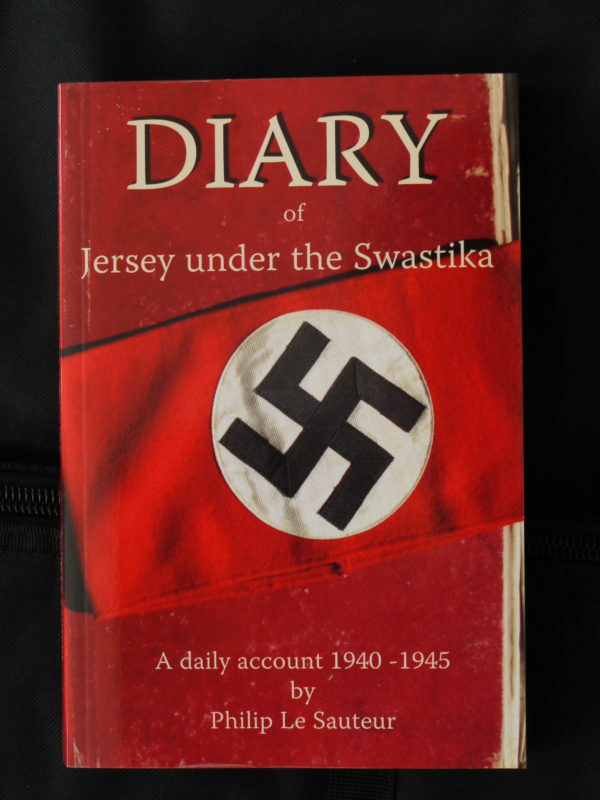The diary was written by Philip Le Sauteur, who, before the Occupation, was the manager of builders’ merchants T F Pirouet & Son, whose store used to be in Union Street, St Helier (where the office block Pirouet House now stands). The owner of the business Commander T Pirouet had been recalled to the Royal Navy at the outbreak of the Second World War and so he had entrusted the business to his manager Philip to look after it whilst he was away. Little did anyone realise that looking after the business would turn out to be a job for five and a half years, the majority of which time Philip Le Sauteur would have to do this without any communication with the world outside of the German occupied Channel Islands.
What I like about this diary is that it is written by someone who didn’t hold public office or had a job which brought him into close contact with the German occupiers. It is very much an account of the ordinary man in the street who was living in the cut-off bubble of occupied Jersey, and how he and others like him reacted to the effects that occupation had on everyday life.
The main two things which seem to have pre-occupied Philip were food and factual news. What these things had in common was that they were in short supply from pretty much the start of the Occupation. Considerable time was spent sourcing the next meals, as well as discussing the news as it reported by the censored Jersey Evening Post newspaper, or by the BBC, which many listened to on illegally held radio sets. Then there were rumours in greater quantities than both the two sources put together. Philip Le Sauteur clearly felt that he had a duty to try and sift through the rumours before he wrote them down in his diary as true, but even then, he often admits that he is not convinced himself. The way in which he reflects all the uncertainties and fears that the ordinary population must have had by writing down his own thoughts is the most compelling part of the diary.
And it is that part of the diary which is different to the other diaries. Sinel’s diary (he was a proof-reader at the Jersey Evening Post) is very factual in its entries. For that reason, each entry is relatively short and there is no dwelling on what the other rumours were. Sinel’s diary is also not a particularly easy book to read cover to cover, being quite dry, whereas Philip Le Sauteur’s has an easier style.
Deputy Edward Le Quesne’s diary is of a man, a member of the States of Jersey, thrust into an official role dealing with an occupying power which he could never have envisaged. He struggled to cope with and agonised over decisions which he had to make which affected the lives of other Islanders. It gives a useful insight into life under German rule from the perspective of the Jersey Government, often with no or little option other than to obey a German order or directive. It doesn’t really give the reader much idea of what the ordinary islander was thinking and how he or she was coping with the uncertainty of life fuelled by rumour.
Than there is Nan Le Ruez’s diary. She was an ordinary young Jersey woman when she wrote her diary. However there were differences between her and Philip Le Sauteur. She was a Sunday school teacher who lived in the countryside, and much of what she wrote reflected that and her feelings for her fiancé (a Methodist missionary) from whom she was separated for the duration of the Occupation. Philip on the other hand was a single man, who had decided to stay behind in Jersey to look after his elderly mother and this decision was one which he from time to time regretted when things got particularly tough over the next five years. He also worked in town and during the days, when business wasn’t brisk (which was most days it would seem), there was plenty of time to meet and discuss the news and rumour-mill with the many similarly placed locals.
Those who have read one or more of the other Occupation diaries, or the Occupation histories (like “Living with the Enemy – What really happened” or Cruikshank’s “German Occupation of the Channel Islands”), will have a reasonable knowledge of what happened in the Channel Islands over that five year period. You will enjoy Philip Le Sauteur’s diary as it fills in lots of gaps in those other accounts. It is also fascinating in the way that it gives us an insight as to how difficult it was to cope with not really knowing what was true and what was false. This hits home even harder as with our present knowledge and hindsight, we can spot those stories which we would have disregarded.
If you are a newcomer to the German Occupation of the Channel Islands, (and I confess that I am at a disadvantage here), I think that Philip’s diary might be a bit harder to follow as he wrote the diary primarily for his absent family who would have had much of the background knowledge necessary to understand what he was trying to recount. Philip Le Sauteur hadn’t intended the diary it to be a stand alone account of the Occupation which would be published. If you are a newcomer, read one or more of the other Occupation books first and you will enjoy this diary as much as I did!
And yes, most of the keys event dates and facts reported do tally up!
Marc Yates
Jersey Military Tours
“Diary of Jersey under the Swastika, a daily account 1940-1945” by Philip Le Sauteur is published by Seeker Publishing & Distribution

